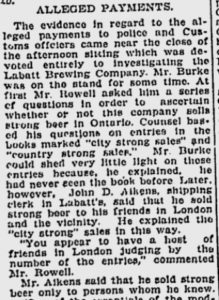 Coming to the end of the first draft of the Ontario beer history Jordan and I are writing, I find myself in the spring of 1927 at the Toronto hearings of the Federal Royal Commission on Customs and Excise. Officials from every major brewery in the province are being grilled under cross examination on their business smuggling beer into the United States. The glimpses of honesty through the lies are just good clean fun. When the manager of Carling was asked if they couldn’t make a profit at $1.75 a case, he replied “well, you can’t make a large profit.”
Coming to the end of the first draft of the Ontario beer history Jordan and I are writing, I find myself in the spring of 1927 at the Toronto hearings of the Federal Royal Commission on Customs and Excise. Officials from every major brewery in the province are being grilled under cross examination on their business smuggling beer into the United States. The glimpses of honesty through the lies are just good clean fun. When the manager of Carling was asked if they couldn’t make a profit at $1.75 a case, he replied “well, you can’t make a large profit.”
But of all the people in the witness box, I like John D. Aikens best. A shipping clerk, he appeared in the middle of row upon row of owners and business managers. While he cannot claim to be like Washington who never told a lie… he couldn’t tell a good lie. See, while all the others were crafting their tales to place all sales beyond the border and therefore beyond excise taxation, young Aikens tried to make everything better by letting the Royal Commission know he only sold illegal beer to his friends. That’d be OK, right? By the time the legal inquiries and hearings were done, the Supreme Court of Canada found it likely that O’Keefe bootlegged 17% of its production for cash within Ontario. That’s a heck of a lot of friends. And over $420,000 in back taxes.

Kathryn Stock – January 31, 2014 6:47 PM
Hello. I was interested to find your website and this article. I am a descendant of James Stock, one of the customs officials in Toronto who testified at this inquiry. I am myself reading through the coverage of the investigation via the Montreal gazette and wondering if you have any other sources to share.
Alan – January 31, 2014 9:58 PM
No, that is all I have seen so far Kathryn. If you were able to get to a decent law library or a big city one you may find the records of the Royal Commission but maybe only the report,